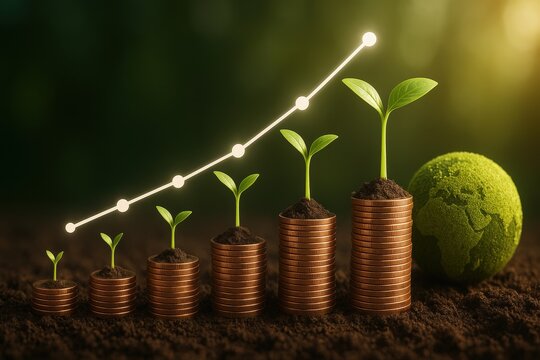
By Prof. Wayne Dunn, President & Founder, CSR | ESG Training Institute
FREE MONEY? Not quite, but close.
Ghana’s businesses could earn $150-200 million annually from carbon credits by 2030, while government could access $2-3 billion in cheaper green financing—transforming sustainability from compliance cost into competitive advantage across both sectors.
For businesses, carbon projects generate immediate revenue while reducing operational costs. A medium-sized Ghanaian manufacturer implementing energy efficiency can earn 10,000-50,000 carbon credits annually at $10-15 per credit, generating $100,000-750,000 in additional revenue. Green financing offers 0.25-0.75% better borrowing rates—saving a company with GH¢50 million debt approximately GH¢125,000-375,000 annually.

For government, sovereign green bonds provide cheaper infrastructure financing while carbon projects create new revenue streams. Kenya’s $150 million green bond achieved 0.5% better rates than conventional bonds. Ghana’s potential forest restoration could generate 2-3 million carbon credits over 20 years, worth $20-45 million.
These opportunities align perfectly with Ghana’s accelerating sustainability focus. The recent renaming of the Ministry of Energy to the Ministry of Energy and Green Transition explicitly embeds green transition in government policy. The creation of a Minister of State for Sustainability demonstrates cabinet-level commitment, while the new National Climate Change & Sustainability Hub (announced July 29, 2025) provides coordination and innovation infrastructure for climate action.

This institutional framework, combined with Ghana’s Carbon Market Office, creates unique competitive advantages unavailable elsewhere in West Africa for both government financing and private sector revenue generation.
Carbon Credits represent verified reductions in greenhouse gas emissions, traded at $8-15 per ton CO2 equivalent. Projects earn credits through forest restoration, renewable energy, improved agriculture, or waste management. These credits are sold to companies and governments needing to offset their emissions.
Green Bonds are debt securities specifically earmarked for environmental projects. They typically offer 0.25-0.75% lower interest rates than conventional bonds because they attract ESG-focused investors managing over $35 trillion globally.
Carbon Credits: Kenya’s forest conservation projects have generated over 1.5 million carbon credits since 2020. South Africa’s renewable energy program produces approximately 500,000 credits annually. Ethiopia’s reforestation initiative is projected to earn $50 million through carbon markets over 15 years.
Green Bonds: Nigeria issued a $150 million green bond in 2017, followed by additional issuances. Kenya’s $150 million green bond in 2019 was oversubscribed by 130%. South Africa has issued over $1 billion in green bonds since 2012, demonstrating consistent market appetite.
Ghana’s Carbon Market Office provides competitive advantages unavailable elsewhere in West Africa:
This infrastructure enables faster project deployment and higher value realization than ad-hoc approaches used by neighboring countries.
Utilities: A water utility cutting energy consumption by 18% earns carbon credits from avoided grid emissions while qualifying for sustainability-linked loans with 25-75 basis point rate reductions.
Manufacturers: A plant installing solar plus heat recovery reduces electricity bills 10-25% and earns credits from displaced emissions, then refinances on better terms.
Agriculture: Cocoa cooperatives implementing regenerative practices can aggregate thousands of smallholder plots into programs sharing carbon revenue with farmers while unlocking premium market access.
Pick Your Lane: Choose energy efficiency, waste/methane, forestry, or agricultural carbon based on your core assets and data readiness.
Measure and Verify: Establish baselines (kWh used, diesel consumed, hectares managed) and engage recognized standards (Gold Standard, Verra) through Ghana Carbon Market Office.
Aggregate for Scale: Combine sites or communities to make transaction costs viable, ensuring revenue-sharing with farmers, staff, and communities.
Structure Credibility: Use transparent accounting, quarterly reporting, and stakeholder oversight to build long-term buyer relationships.
Early movers capture lasting competitive advantages. Government entities accessing green finance establish preferred relationships with development banks while building institutional capacity. Private companies developing carbon projects create recurring revenue streams while strengthening ESG profiles for better financing terms.
International buyers increasingly prefer African carbon credits due to additional development benefits. Ghana’s political stability and institutional strength make it a preferred partner for long-term carbon purchase agreements.
Government: Develop sovereign green bond framework for infrastructure financing. Launch national forest restoration program targeting 100,000 hectares for carbon credit generation.
Private Sector: Assess facilities for energy efficiency and renewable energy opportunities. Aggregate supply chain partners for collective carbon project development.
Agriculture: Implement soil carbon and methane reduction projects across cocoa and rice sectors.
Waste: Deploy landfill gas capture and waste-to-energy projects in major cities.
The path forward is simple: define your business case, map your ESG SWOT, and start now. Delay carries a measurable price tag. For Ghana’s financial sector, ESG is not a narrative—it’s a bottom-line imperative.
Carbon prices fluctuate, requiring diversified project portfolios. International standards evolve, necessitating ongoing compliance monitoring. However, Ghana’s institutional framework and Carbon Market Office provide risk mitigation unavailable to less organized markets.

Ghana possesses infrastructure, institutional capacity, and natural advantages to monetize sustainability immediately. The convergence of global climate finance and domestic green assets creates unprecedented revenue opportunities for both government and the private sector.
Organizations acting now secure premium positioning in rapidly growing markets worth hundreds of billions globally. Those waiting for mandates miss the early-mover advantages that define long-term competitiveness in ESG-driven markets.
The pathway is clear: leverage Ghana’s competitive advantages to transform sustainability from cost into profit center, strengthening both financial performance and environmental impact.